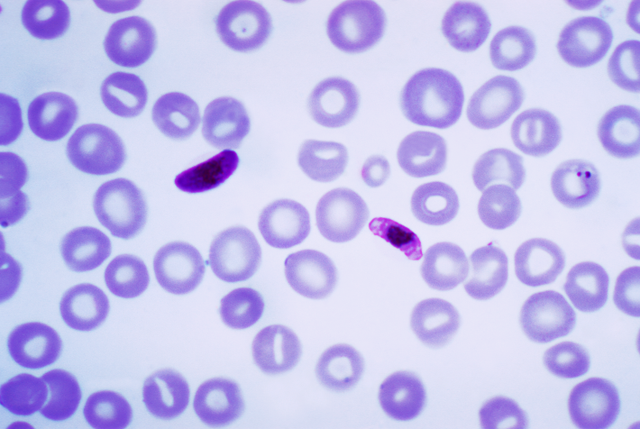A first case report of Plasmodium knowlesi infection in Saraburi Hospital and pitfall of malaria diagnosis by microscopic technique
Keywords:
malaria, Plasmodium knowlesi, microscopic technique, molecular techniqueAbstract
Malaria is caused by Plasmodium infection. All species can be transmitted from human to human but Plasmodium knowlesi is a zoonosis. The differentiate diagnosis of P. knowlesi via a microscopic technique is difficult and requires high experience. Because the characteristics of early trophozoite of P. knowlesi are similar to P. falciparum, while growing trophozoite are similar to P. malariae. Therefore, the classification of this species is high rate of misidentification. According to WHO recommendations, P. knowlesi may be confirmed with molecular technique. In 2019, a 23-year-old male patient admitted at Saraburi Hospital with high fever, chills and shaking in the evening period for 6 days. Thin blood smear was positive 0.2% of parasitemia with ring form and growing trophozoite suggestive non-P. falciparum malaria infection (P. vivax). Surprisingly, The PCR was demonstrated positive with P. knowlesi infection. However, microscopic examination of differentiating P. knowlesi has limitations and may be considered molecular technique support in complicated cases with low parasitemia, unclassified morphologic appearance and non-endemic area.
References
พรทิพย์ เพ็ชรมิตร, รชตวรรณ เฉียบฉลาด, แสงเดือน มูลสม, องอาจ มหิทธิกร, ศรีวิชา ครุฑสูตร. "การตรวจวินิจฉัยเชื้อมาลาเรียและการรายงานผลตามมาตรฐานสากล" ภาควิชาโปรโตซัว คณะเวชศาสตร์เขตร้อน มหาวิทยาลัยมหิดล; 2562
Malaria online. Thailand Malaria Elimination Program. [cited August 4, 2022] Available from: http://malaria.ddc.moph.go.th/malariaR10/index_newversion.php
สมชาย จงวุฒิเวศย์, อุษา ทิสยากร. มาลาเรีย (Malaria). โรงพิมพ์ ธนาเพรส จำกัด. กรุงเทพมหานคร; 2549
Mahittikorn, A., Masangkay, F. R., Kotepui, K. U., Milanez, G. J. & Kotepui, M. Comparison of Plasmodium ovale curtisi and Plasmodium ovale wallikeri infections by a meta-analysis approach. Sci Rep 11, 6409, doi:10.1038/s41598-021-85398-w (2021).
Varo, R., Chaccour, C. & Bassat, Q. Update on malaria. Med Clin (Barc) 155, 395-402, doi:10.1016/j.medcli.2020.05.010 (2020).
Milner, D. A., Jr. Malaria Pathogenesis. Cold Spring Harb Perspect Med 8, doi:10.1101/cshperspect.a025569 (2018).
Singh, B. & Daneshvar, C. Human infections and detection of Plasmodium knowlesi. Clin Microbiol Rev 26, 165-184, doi:10.1128/CMR.00079-12 (2013).
Jeyaprakasam, N. K., Liew, J. W. K., Low, V. L., Wan-Sulaiman, W. Y. & Vythilingam, I. Plasmodium knowlesi infecting humans in Southeast Asia: What's next? PLoS Negl Trop Dis 14, e0008900, doi:10.1371/journal.pntd.0008900 (2020).
กองโรคติดต่อนำโดยแมลง กรมควบคุมโรค กระทรวงสาธารณสุข. แนวทางเวชปฏิบัติในการรักษาผู้ป่วยโรคไข้มาลาเรีย. ประเทศไทย; 2564 [cited August 4, 2022] Available from: http://malaria.ddc.moph.go.th/downloadfiles/Malaria_Manual/[Guideline]_Malaria_Treatment_2564_NTG.pdf
Patel, J. C. et al. Field evaluation of a real-time fluorescence loop-mediated isothermal amplification assay, RealAmp, for the diagnosis of malaria in Thailand and India. J Infect Dis 210, 1180-1187, doi:10.1093/infdis/jiu252 (2014).
Mahittikorn, A., Masangkay, F. R., Kotepui, K. U., De Jesus Milanez, G. & Kotepui, M. Comparative performance of PCR using DNA extracted from dried blood spots and whole blood samples for malaria diagnosis: a meta-analysis. Sci Rep 11, 4845, doi:10.1038/s41598-021-83977-5 (2021).
Mahittikorn, A., Masangkay, F. R., Kotepui, K. U., Milanez, G. J. & Kotepui, M. Quantification of the misidentification of Plasmodium knowlesi as Plasmodium malariae by microscopy: an analysis of 1569 P. knowlesi cases. Malar J 20, 179, doi:10.1186/s12936-021-03714-1 (2021).
Traipattanakul J, Changpradub D, Trakulhun K, Phiboonbanakit D & M, M. A First Case of Plasmodium knowlesi Malaria in Phramongkutklao Hospital. J Infect Dis Antimicrob Agents 31, 91-100 (2014).

Downloads
Published
How to Cite
Issue
Section
License
Copyright (c) 2022 PEERAPONG KAMJAI

This work is licensed under a Creative Commons Attribution-NonCommercial-NoDerivatives 4.0 International License.
Journal of TCI is licensed under a Creative Commons Attribution-NonCommercial-NoDerivatives 4.0 International (CC BY-NC-ND 4.0) licence, unless otherwise stated. Please read our Policies page for more information.





